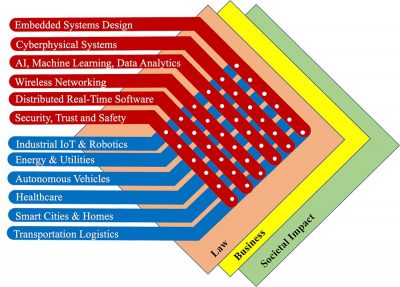The UTC Institute for Advanced Systems Engineering received a small award from the National Science Foundation for the planning of an Industry University Cooperative Research Center. Led by Dr. George Bollas and with participation of researchers from the UTC-IASE and the Eversource Energy Center, UTC-IASE will organize workshops and info sessions with the goal to attract industry interest for participation in a Center researching Networked Embedded, Smart & Trusted Things. Modern Cyber-Physical Systems (CPS) enable integrated sensing, computing, actuation and communication functions in everyday customer devices (home appliances, buildings, roads, jet engines, automobiles, etc.). Their integration in the “Internet of Things” (IoT) provides an unprecedented opportunity to collectively access and process enormous amounts of data. The vision of the Center for Networked Embedded, Smart and Trusted Things (NESTT) is to contribute to the development of an equitable, safe and secure connected world. NESTT will achieve this vision by focusing on creating holistic IoT solutions, integrating technology disciplines with expertise in law, business, and humanities.
The University of Connecticut will work together with the Arizona State University, University of Southern California, University of Arizona, and Southern Illinois University to form a new NSF Industry University Cooperative Research Center (IUCRC) named NESTT. The objective of the UConn’s site planning project is to hold workshops with industry partners and NESTT partner universities. The goal of these workshops is to outline a research agenda and identify industry support for an IUCRC focused on providing IoT solutions specific to cyber-physical systems, IOT requirements and architecture, cybersecurity, industrial IOT for smart manufacturing, smart buildings, grid modernization, and transportation. These application areas will be supported by UConn’s expertise in systems engineering, distributed edge and cloud computing, formal methods, machine learning, data analytics, cyber-physical security, prognostics and diagnostics.
The multidisciplinary research at NESTT aims to integrate societal and technological aspects of IoT as a systems engineering and design problem. New scientific discoveries in NESTT and their integration with industrial practice could enable economic growth and provide societal and environmental benefits. Access and opportunities to students who are underrepresented in STEM disciplines and relevant technology areas will be a priority.
The agenda, list of participants and outcomes of the UConn’s NESTT IUCRC planning workshops will be posted online at UConn under the auspices of the UTC Institute for Advanced Systems Engineering (http://iase.engr.uconn.edu) and promoted through its social media venues. For more information about NESTT visit this link: https://fulton.sp10.asu.edu/cidse/CES/SitePages/NESTT.aspx
